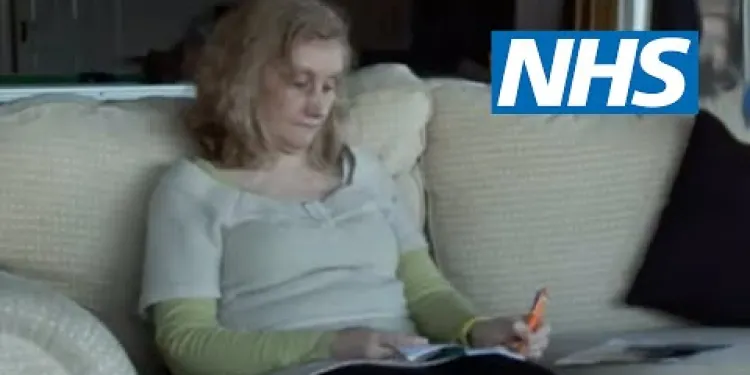Find Help
More Items From Ergsy search
-

Fibromyalgia: Suzanne's story | NHS
Relevance: 100%
-

What conditions is ketamine used to treat?
Relevance: 13%
-

Are there health benefits to using cannabis extract?
Relevance: 13%
-

Why is it important to increase awareness about CFS?
Relevance: 13%
-

Who is at risk of developing chronic fatigue syndrome?
Relevance: 6%
-

Can cortisol levels impact mood and mental health?
Relevance: 6%
-

How can I legally obtain ketamine for medical use?
Relevance: 6%
-

About irritable bowel syndrome (IBS)
Relevance: 6%
-

How does CFS differ from regular fatigue?
Relevance: 6%
Fibromyalgia: Suzanne's Story | NHS
Introduction to Fibromyalgia
Fibromyalgia is a long-term condition that causes pain all over the body. It can significantly affect the quality of life of those who suffer from it. In this story, we will explore Suzanne's experience with fibromyalgia and how she manages the condition with the support of the NHS in the United Kingdom.Suzanne's Initial Symptoms
Suzanne first began to experience symptoms in her late 30s, starting with persistent body aches and extreme fatigue. She initially shrugged it off as normal tiredness or the effects of a busy lifestyle. However, the pain gradually became more intense and widespread. Simple tasks like getting out of bed or walking up the stairs became increasingly difficult.Seeking Medical Help
Recognizing that her symptoms were not improving, Suzanne decided to consult her GP. After a series of tests and specialist referrals, she was diagnosed with fibromyalgia. It was a relief to finally put a name to her symptoms, though she also felt overwhelmed by what the future might hold.Treatment and Management
Suzanne's treatment plan was developed with her GP and a rheumatologist, focusing on a combination of medication, physical therapy, and lifestyle changes. She is prescribed pain relievers and antidepressants to manage her symptoms. Physical therapy sessions help to improve her mobility, while a regular exercise routine, recommended by her physiotherapist, helps to reduce stiffness and improve her overall well-being.NHS Resources and Support
The NHS provides a range of resources and support for people with fibromyalgia. Suzanne found the NHS online resources particularly helpful. She also joins support groups, both online and in-person, connecting with others who understand what she is going through. These platforms offer emotional support and practical advice on managing daily challenges.Living with Fibromyalgia
Living with fibromyalgia has taught Suzanne to listen to her body and not to push herself too hard. She has learned to pace her activities and incorporate rest breaks into her day. With the ongoing support of her healthcare team and community, Suzanne has managed to find a balance that allows her to enjoy life despite her condition. She continues to advocate for more awareness and understanding of fibromyalgia, hoping to help others who might be struggling.Conclusion
Suzanne's story highlights the importance of early diagnosis, comprehensive treatment, and the support available through the NHS for those living with fibromyalgia. While it is a challenging condition, proper management and a strong support system can significantly improve the quality of life for sufferers in the United Kingdom.Fibromyalgia: Suzanne's Story | NHS
Introduction
Fibromyalgia is a long-term condition that causes pain all over the body. It's particularly challenging as it affects each individual differently. Here, we explore the journey of Suzanne, a resilient woman from the United Kingdom, who has been living with fibromyalgia and learning to manage her symptoms with support from the NHS.
Suzanne's Diagnosis
For years, Suzanne struggled with persistent fatigue, widespread pain, and difficulty sleeping, which led to confusion and frustration. After various consultations and tests, doctors at her local NHS clinic diagnosed her with fibromyalgia. The diagnosis was overwhelming, yet it finally provided an explanation for her symptoms.
Managing Symptoms
With the help of NHS healthcare providers, Suzanne developed a comprehensive management plan. This included medication to alleviate pain, as well as cognitive behavioural therapy sessions to address mental health challenges, such as stress and anxiety, that often accompany fibromyalgia.
Support and Community
Suzanne discovered local support groups where she found comfort in sharing her experiences with others facing similar challenges. These community resources, often recommended by her NHS care team, play an essential role in managing the emotional impact of fibromyalgia.
The Role of Lifestyle Changes
In consultation with her NHS physiotherapist, Suzanne incorporated gentle exercises, such as swimming and yoga, into her daily routine. These activities improved her mobility and reduced her pain levels. Additionally, she focused on maintaining a balanced diet and ensuring adequate rest.
Looking to the Future
Suzanne remains optimistic, knowing her NHS care team continues to support her journey. Her story highlights the importance of personalised treatment plans and the vital role both medical and community resources play in managing life with fibromyalgia in the UK.
For detailed resources and support, the NHS website offers comprehensive guides and tools for those living with fibromyalgia.
Fibromyalgia: Suzanne's Story | NHS
What is Fibromyalgia?
Fibromyalgia is a condition that causes pain all over your body. It is something people live with for a long time. This story is about Suzanne and how she deals with fibromyalgia with help from the NHS in the UK.How Suzanne's Symptoms Started
Suzanne began to notice symptoms when she was in her late 30s. She felt tired all the time and her body ached. At first, she thought it was just normal tiredness from being busy. But soon, the pain spread and got worse. Simple things like getting out of bed or going up stairs became hard.Getting Medical Help
Suzanne realized that her symptoms were not going away. So, she went to see her family doctor, called a GP. After some tests, doctors told her she had fibromyalgia. Suzanne was relieved to know what was wrong but also worried about her future.How Suzanne Manages Her Condition
Suzanne's doctors made a plan to help her feel better. She works with her GP and a rheumatologist. She takes medicine to help with pain and to feel happier. Suzanne also does physical therapy to move better. Her therapist gave her exercises to do to help with stiffness and to feel good.NHS Help and Support
The NHS has many ways to help people with fibromyalgia. Suzanne finds their online resources very useful. She also joins support groups, both on the internet and in real life. These groups help her connect with others who understand and offer advice.Suzanne's Life with Fibromyalgia
Living with fibromyalgia has taught Suzanne to listen to her body. She makes sure to take breaks and not do too much. With help from her doctors and friends, Suzanne has found a way to enjoy life. She also tells others about fibromyalgia to help spread understanding.Ending Thoughts
Suzanne's story shows how important it is to get help early and have good support. With the right care from the NHS, people with fibromyalgia can live better lives even though it is a hard condition.Fibromyalgia: Suzanne's Story | NHS
Introduction
Fibromyalgia is a condition that makes your whole body hurt. It can be hard to live with because it affects everyone differently. This story is about Suzanne, who lives in the UK. She has fibromyalgia and gets help from the NHS to feel better.
Suzanne's Diagnosis
For a long time, Suzanne felt very tired, had pain all over, and couldn't sleep well. This made her feel confused and upset. After seeing many doctors, she found out she had fibromyalgia. This news was a lot to take in, but it helped her understand why she felt this way.
Managing Symptoms
The NHS helped Suzanne make a plan to manage her symptoms. She takes medicine for the pain. She also talks to a therapist to help with the stress and worries that come with fibromyalgia.
Support and Community
Suzanne found support groups where she can talk to other people who are going through the same thing. These groups help her feel better emotionally. Her NHS care team suggested joining these groups, which are very helpful.
The Role of Lifestyle Changes
With advice from her NHS physiotherapist, Suzanne started doing gentle exercises like swimming and yoga every day. These exercises help her move better and reduce her pain. She also tries to eat healthy and get enough rest.
Looking to the Future
Suzanne stays hopeful because she knows her NHS care team is there for her. Her story shows how important it is to have a plan that is just for you. Both medical help and community support are key to living with fibromyalgia in the UK.
If you want more information and support, the NHS website has guides and tools for people with fibromyalgia.
Frequently Asked Questions
What is fibromyalgia?
Fibromyalgia is a long-term condition that causes pain all over the body, along with other symptoms such as extreme tiredness and difficulty sleeping.
Who is Suzanne mentioned in the story?
Suzanne is a patient with fibromyalgia who shares her personal experiences living with the condition on the NHS website.
What are some common symptoms of fibromyalgia?
Common symptoms include widespread pain, fatigue, difficulties with sleep, headaches, and problems with memory and concentration.
How is fibromyalgia diagnosed?
Fibromyalgia is usually diagnosed based on symptoms, a physical exam, and ruling out other conditions since there is no specific test for it.
What can trigger fibromyalgia symptoms?
Stress, lack of sleep, physical activity, and certain weather conditions can trigger or worsen fibromyalgia symptoms.
Is there a cure for fibromyalgia?
Currently, there is no cure for fibromyalgia, but symptoms can be managed through a combination of medication, lifestyle changes, and therapies.
What treatments are available for fibromyalgia?
Treatments include pain relievers, antidepressants, physical therapy, exercise, and cognitive behavioral therapy.
How does fibromyalgia affect daily life?
Fibromyalgia can make daily activities challenging due to chronic pain and fatigue, impacting work, social life, and emotional well-being.
Can fibromyalgia lead to psychological issues?
Yes, living with chronic pain and fatigue can lead to anxiety and depression in some individuals with fibromyalgia.
Are there support groups for people with fibromyalgia in the UK?
Yes, there are various support groups and charities in the UK offering advice and support for people with fibromyalgia.
Can lifestyle changes help with managing fibromyalgia?
Adopting a healthy lifestyle, including regular exercise, a balanced diet, and ample rest, can help manage fibromyalgia symptoms.
What role does diet play in managing fibromyalgia?
While there's no specific fibromyalgia diet, a healthy, balanced diet can help reduce symptoms and improve overall well-being.
Why is it important to educate others about fibromyalgia?
Increasing awareness helps reduce stigma and misunderstandings, enabling better support and accommodations for those affected.
How can workplaces support employees with fibromyalgia?
Workplaces can provide flexible schedules, ergonomic assessments, and understanding attitudes to help accommodate employees with fibromyalgia.
What advice does Suzanne offer to those newly diagnosed with fibromyalgia?
Suzanne advises learning as much as possible about the condition, seeking support, and finding a management strategy that works for you.
What is fibromyalgia?
Fibromyalgia is an illness. It makes people feel pain all over their bodies. They can feel very tired. It can be hard to sleep.
People with fibromyalgia might have problems remembering things. This is called "fibro fog."
Doctors can help. They can give medicine. Exercises and rest can also help.
Talking to a therapist or joining a support group can make things easier.
Fibromyalgia is a health problem that makes your whole body hurt. It can also make you very tired and have trouble sleeping.
Who is Suzanne in the story?
Suzanne is a person who talks about having fibromyalgia. She shares her story on the NHS website.
What are some common signs of fibromyalgia?
Here are some signs you might notice if you have fibromyalgia:
- You feel pain in lots of places on your body.
- You feel very tired, even after sleeping.
- Your muscles feel stiff, especially in the morning.
- You might have trouble remembering things.
Tools that can help you understand fibromyalgia better:
- Ask someone you trust to help you read and understand this.
- Use pictures to help explain what you feel.
- Talk to a doctor or nurse if you think you might have these signs.
Common symptoms are:
- Feeling sore all over your body
- Feeling very tired
- Having trouble sleeping
- Getting headaches
- Finding it hard to remember things or pay attention
It can help to:
- Write things down so you don’t forget
- Get good rest
- Ask someone for help if you need it
How do doctors find out if someone has fibromyalgia?
Doctors find out if you have fibromyalgia by looking at your symptoms and checking your body. They also make sure it is not another illness because there is no special test for fibromyalgia.
What can start fibromyalgia symptoms?
Fibromyalgia can make people feel sore and tired. Here are some things that can start these feelings:
- Being stressed or worried
- Too much physical activity
- Not moving enough
- Not getting enough sleep
- Bad weather, like when it's cold or wet
- Being hurt or sick
Use reminders to help remember things that help you feel better. Try to rest and stay calm.
Things like stress, not sleeping enough, being very active, and some kinds of weather can make fibromyalgia symptoms start or get worse.
Can fibromyalgia be cured?
Fibromyalgia is a condition that makes people feel pain all over their body. Right now, there is no cure for fibromyalgia. This means doctors cannot make it go away completely.
But, there are ways to help feel better:
- Medicine: Doctors can give pills that help with pain.
- Exercise: Moving your body can make you feel stronger and less tired.
- Relaxation: Breathing deeply and resting can help calm the body.
- Talk to someone: Sometimes talking with a doctor or a counselor helps too.
It’s a good idea to work with doctors to know what can help. Trying different things might make you feel better.
Right now, doctors can't make fibromyalgia go away completely. But you can feel better by taking medicine, changing some things in your life, and trying different types of treatments.
What can help if you have fibromyalgia?
There are different ways to help you feel better. You can take medicine for pain or for feeling sad. Doing exercises can also help. You might go to a special doctor who teaches you how to move your body. Talking to someone who helps you think in a better way can also be good. Try using a calendar or alarm to remind you to do these things.
How does fibromyalgia affect daily life?
Fibromyalgia can make people feel tired and sore. It can be hard to do normal things like shopping or playing. People might also feel sad or worried.
Here are some ways to feel better:
- Rest often.
- Try gentle exercises like walking.
- Talk to someone you trust about how you feel.
- Use a warm blanket or take a warm bath.
Fibromyalgia is a condition that can make doing everyday things hard. It can cause pain and make you feel very tired all the time. This can make it hard to work, see friends, and feel happy.
Does fibromyalgia cause mental health problems?
Fibromyalgia is a health problem that makes your body hurt. It can also make people feel sad or worried. It's important to talk to a doctor if you feel this way.
If you have fibromyalgia, you can:
- Talk to a doctor or therapist. They can help you feel better.
- Join a support group. It helps to talk to people who understand.
- Try relaxation exercises like deep breathing or yoga.
These steps can make you feel better.
Yes, living with long-term pain and tiredness can make some people with fibromyalgia feel worried or sad.
Can people with fibromyalgia in the UK find support groups?
Yes, there are groups and charities in the UK that can help people with fibromyalgia. They give advice and support.
Can changing how we live help with fibromyalgia?
Fibromyalgia is a condition that makes people feel pain and tired. Making some changes in daily life can help. Here are some tips:
- Exercise: Try gentle activities like walking or swimming. It can help your body feel better.
- Sleep: Get enough sleep. Try to go to bed and wake up at the same time every day.
- Relaxation: Practice deep breathing or listen to calming music to relax your mind and body.
- Healthy Eating: Eat fruits, vegetables, and other healthy foods. It can give your body the energy it needs.
Some tools that might help are:
- Apps: Use apps that remind you to stay active or help you relax.
- Support groups: Talk to others who have fibromyalgia. Sharing tips can be helpful.
Living healthy can help with fibromyalgia. This means doing exercises often, eating good food, and getting enough sleep.
How does food help with fibromyalgia?
Food can help you feel better if you have fibromyalgia. Eating the right foods can give you more energy and make your pain less. Try to eat lots of fruits, vegetables, and whole grains. These foods are healthy and good for your body.
It can also help to keep a food diary. Write down what you eat and how you feel. This can help you see if certain foods make you feel better or worse.
You can also talk to a doctor or a dietitian. They can help you choose the best foods for you.
There isn't a special diet for fibromyalgia. But eating healthy foods can help you feel better and make your symptoms less. It is good for your body.
Why Should We Teach Others About Fibromyalgia?
It is good to tell other people about fibromyalgia.
Fibromyalgia is a long-term illness. It makes people feel pain all over their body. It can also make them feel very tired.
Some people do not know what fibromyalgia is. They might not understand how it makes people feel.
By telling others about fibromyalgia, we can help them understand and be kind.
When we teach people, they can support friends or family who have fibromyalgia.
You can use pictures or stories to help explain fibromyalgia. These can make it easier to understand.
Learning more helps everyone understand better. This makes people kinder and more helpful to those who need it.
How can workplaces help workers with fibromyalgia?
Fibromyalgia is a condition that can make people feel pain and very tired. Here are some ways workplaces can help:
- Talk and Listen: Workers can talk with their bosses about what they need. It is good to listen and understand each other.
- Flexible Hours: Allowing workers to choose different work times can help them feel better.
- Comfortable Space: Make sure the workplace is cozy and not too noisy. Workers might need a soft chair or a quiet room.
- Breaks: Give workers enough breaks to rest their body and mind.
- Work from Home: Sometimes, working from home can be helpful.
Helpful Tools: Using planners or reminder apps can help workers keep track of tasks. Breathing exercises or gentle stretches can also help them relax.
Workplaces can help people with fibromyalgia by offering flexible work times, checking their desks and chairs are comfy, and being kind and understanding. Some people find it useful to use tools and techniques like taking short breaks, doing simple stretches, or using things like cushions and supports for comfort.
What tips does Suzanne give to people who just found out they have fibromyalgia?
Fibromyalgia is when you often feel pain all over your body. It can make you feel very tired too.
Suzanne has some tips to help:
- Talk to your doctor: They can help and answer your questions.
- Rest and relax: Make sure you get enough sleep.
- Move a little every day: Gentle exercise like walking can be good for you.
- Eat healthy foods: Good food can make you feel better.
- Talk to friends or family: They can support you and make you feel better.
- Write down your feelings: This can help you understand your pain and feelings.
Using these tips might make you feel better.
Suzanne says it is good to learn about the condition. Ask for help if you need it. Find a way to manage it that works best for you.
Useful Links
This website offers general information and is not a substitute for professional advice.
Always seek guidance from qualified professionals.
If you have any medical concerns or need urgent help, contact a healthcare professional or emergency services immediately.
Some of this content was generated with AI assistance. We’ve done our best to keep it accurate, helpful, and human-friendly.
- Ergsy carfully checks the information in the videos we provide here.
- Videos shown by Youtube after a video has completed, have NOT been reviewed by ERGSY.
- To view, click the arrow in centre of video.
- Most of the videos you find here will have subtitles and/or closed captions available.
- You may need to turn these on, and choose your preferred language.
- Go to the video you'd like to watch.
- If closed captions (CC) are available, settings will be visible on the bottom right of the video player.
- To turn on Captions, click settings .
- To turn off Captions, click settings again.
More Items From Ergsy search
-

Fibromyalgia: Suzanne's story | NHS
Relevance: 100%
-

What conditions is ketamine used to treat?
Relevance: 13%
-

Are there health benefits to using cannabis extract?
Relevance: 13%
-

Why is it important to increase awareness about CFS?
Relevance: 13%
-

Who is at risk of developing chronic fatigue syndrome?
Relevance: 6%
-

Can cortisol levels impact mood and mental health?
Relevance: 6%
-

How can I legally obtain ketamine for medical use?
Relevance: 6%
-

About irritable bowel syndrome (IBS)
Relevance: 6%
-

How does CFS differ from regular fatigue?
Relevance: 6%

